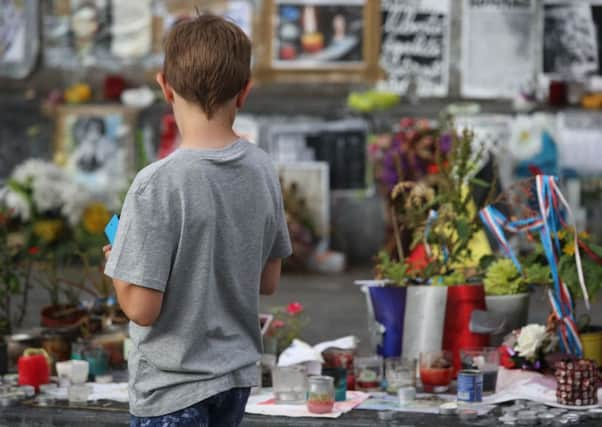Leaders: Consequence of terrorism must not be IS victory


Another day, another brutal killing in a European city. Again France is the victim, and again Islamic State claims to be the perpetrator.
This time it was an 84-year-old priest, Father Jacques Hamel, by all accounts a pillar of his local community, killed in an attack by two armed men during a Mass at his church in a suburb of Rouen in northern France.
Advertisement
Hide AdAdvertisement
Hide AdNow the Pope has spoken out against the “pain and horror of this absurd violence” and French president François Hollande condemned the attack, which comes so soon after the Nice outrage.
And it comes at a time when Germany is reeling from four separate incidents of violence including a suicide bomber. Now the political pressure in these countries is ramping up and beginning to have an effect.
In France, Hollande is under pressure for an alleged cover-up of a national security failure concerning the Nice attack. With questions being asked about exactly what the national government was doing to combat extremist attacks, there are reports that officials tried to say that well-armed national police officers were nearer the scene than they actually were. In itself no great mistake, these events are hard to predict, but the entire row shows just how great the clamour is for action, and just how politically volatile the atmosphere has become.
And in Germany, Angela Merkel has come under fire from both the right and the left for the attacks, with the blame being squarely if inaccurately placed on Merkel’s open door policy for refugees. Merkel stood firm when the Syrian refugee crisis was at its height, when the human toll of the tragedy was there for all to see, and said that Germany would take them in and “wir shaffen das” – “we can cope”.
Now that altruistic stance and the huge influx of immigrants, already controversial given the earlier incidents in Cologne, is putting the chancellor under great pressure.
And of course in the front line of the Syrian refugee crisis, and visited by Merkel, was Turkey. Already riven by internal divides, terrorist attacks from Kurds and Islamic State, and the refugee influx, it had to be persuaded to play a key part in Europe’s handling of the refugee crisis.
But now its president, Recip Tayyan Erdogan, is arresting journalists as he exploits fully the insecurity caused by the failed coup attempt and seeks to extend ruthless control over the country.
It is difficult to see how this will play out politically. The sad fact is little can be done by states to combat the sorts of attacks that are causing such pain and anger in France and Germany and the rest of Europe. But what is clear is that there will be a political consequence and Islamic State will see that as a twisted victory.
Advertisement
Hide AdAdvertisement
Hide AdThe nations who are targets of this must realise that they need to act in a united manner to acknowledge the fears of citizens and to stand united in defiance and defence. Despite the Brexit vote Britain needs now to stand by its allies in any way it can help: this threat is bigger than politics as usual.
Poor outlook for good health
To be recalled to a clinic for further tests after finding a lump or noticing an unusual symptom is a near heart-stopping moment, fraught with worry, both for the patient and their loved ones.
But going to a GP’s surgery and raising concerns, or attending a screening clinic, to even be in the position to receive that vital specialist treatment which could save the life of a mother, father, son, daughter, or friend, is not happening across the social divide in Scotland.
New figures show that the poorest Scots are most likely to diagnosed with cancer when the disease has reached an advanced stage, reducing the chance of a successful intervention and leading to more invasive treatment.
We are already aware that initiatives to widen access to education and employment often encounter obstacles not factored in by policy-makers. We have also been aware for some time of the disadvantages in health most likely to be suffered by those on low incomes.
But while such disparities are measurable in terms of inequality and targets, it is not just about inequality alone. Rather it is quite literally about life and death itself.
If people are poor it is more likely they are denied the choices which maximise the chance of good health, leading to a greater chance of getting cancer.
We’ve heard a lot from the Scottish Government about how tackling inequality is a major priority for 21st century Scotland.
Advertisement
Hide AdAdvertisement
Hide AdBut these latest figures are an example of how deeply embedded social problems are and how innovative thinking will be required to reach those who need the most help – and to safeguard future generations.